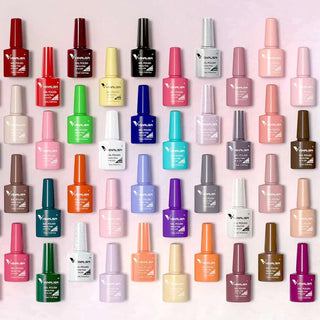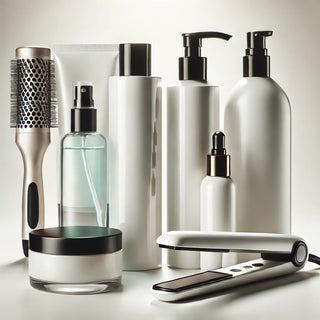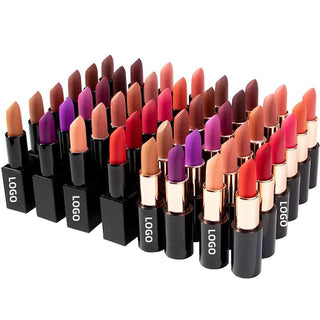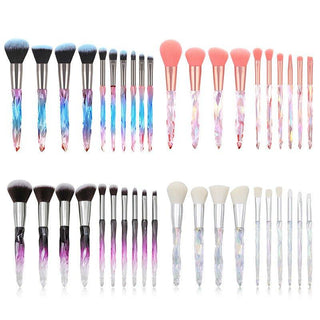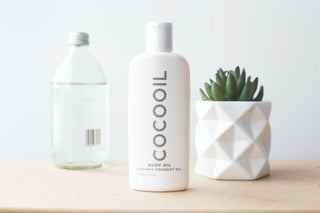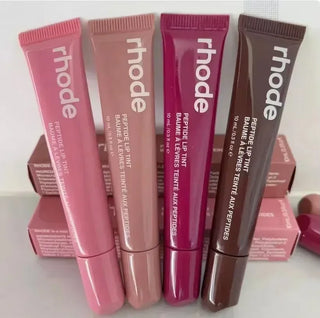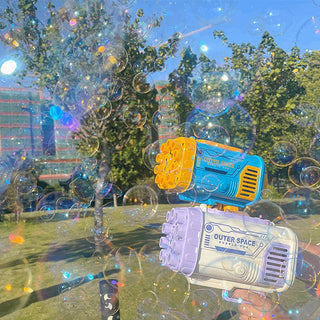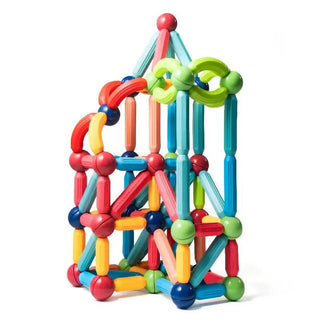So, you want to know how to grow hair faster naturally in a week? Well, getting super long hair in just seven days is a pretty big ask. Hair growth takes time, for real. But, you can totally set your hair up for success and make it as healthy as possible during that week. This can help it grow its best. We'll talk about some good habits and easy tricks to get your hair looking and feeling great, and maybe even a little bit longer, quicker than you thought.
Key Takeaways
- No magic trick makes hair grow super long overnight; it's a process.
- Eating well and staying hydrated really helps your hair health.
- Gentle hair care and regular trims can prevent damage and breakage.
- Some products and treatments can give your hair a good boost.
- Being realistic about how much hair grows in a week is important.
Nourishing Your Hair From Within

It's easy to get caught up in fancy shampoos and treatments, but honestly, what you put inside your body is just as, if not more, important for hair growth. Think of it like this: your hair is the last thing your body worries about. If you're not getting enough nutrients, your body will prioritize vital organs first, and your hair will get the leftovers (if any!).
Fueling Hair Growth with Protein-Rich Foods
Protein is the building block of hair, so skimping on it is a big no-no if you want longer locks. Hair is mostly made of keratin, which is a protein. If you don't eat enough protein, your body can't produce enough keratin, and that can lead to slow growth, weak strands, and even hair loss. I try to include a good source of protein in every meal. It doesn't have to be a huge steak every time, but things like eggs, chicken, fish, beans, lentils, and nuts are all great options.
Essential Vitamins and Minerals for Hair Health
Okay, so protein is the main thing, but vitamins and minerals are like the support system. They help your body use the protein effectively and keep your scalp healthy. Some key players include:
- Vitamin A: Helps with cell growth, including hair cells.
- Vitamin C: An antioxidant that protects hair follicles from damage.
- Vitamin E: Improves scalp circulation.
- Biotin: Often touted for hair growth, and it does play a role in keratin production.
- Iron: Helps carry oxygen to hair follicles.
- Zinc: Important for hair tissue growth and repair.
I'm not a doctor, so I can't give medical advice, but a good multivitamin or a supplement specifically designed for hair, skin, and nails can be a good idea if you're not getting enough of these nutrients from your diet. But remember, supplements are meant to supplement a healthy diet, not replace it!
The Role of Hydration in Hair Vitality
Don't underestimate the power of water! Just like the rest of your body, your hair needs water to thrive. Dehydration can lead to dry, brittle hair that's more prone to breakage. I aim to drink at least eight glasses of water a day, and I definitely notice a difference in my hair (and skin!) when I'm properly hydrated. Plus, staying hydrated is just good for your overall health, so it's a win-win.
Staying hydrated is so important. I always carry a water bottle with me and try to refill it throughout the day. It's a simple habit that can make a big difference in your hair's health and appearance.
Optimizing Your Hair Care Routine

Gentle Washing Techniques for Healthy Strands
Okay, so washing your hair seems pretty straightforward, right? But honestly, how you wash it can make a big difference. The goal is to cleanse without stripping away all the natural oils that keep your hair healthy. I used to just pile on the shampoo and scrub like crazy, but my hair was always dry and frizzy. Now, I focus on massaging the shampoo into my scalp and letting it rinse through the ends. It's way gentler, and my hair feels so much better.
- Use lukewarm water instead of hot water.
- Concentrate shampoo on the scalp, not the ends.
- Consider a sulfate-free shampoo to retain moisture.
I switched to washing my hair every other day instead of every day, and it's helped a lot with dryness. It took a little getting used to, but now my hair isn't as oily, and it feels healthier overall.
The Benefits of Regular Trims for Growth
I know, I know, trimming your hair when you're trying to grow it out seems counterintuitive. But trust me on this one. Getting regular trims is super important. Think of it like pruning a plant – you're getting rid of the dead ends so the healthy parts can thrive.
- Prevents split ends from traveling up the hair shaft.
- Makes hair look thicker and fuller.
- Removes damaged ends that hinder growth.
| Trim Frequency | Benefit |
|---|---|
| Every 6-8 weeks | Prevents significant split end damage. |
| Every 12 weeks | Good for maintaining shape and length. |
Protecting Hair from Heat and Chemical Damage
Heat styling and chemical treatments can really take a toll on your hair. I'm guilty of using my straightener way too often, but I've learned that protecting my hair is key if I want it to grow long and strong.
- Always use a heat protectant spray before styling.
- Lower the temperature on your styling tools.
- Space out chemical treatments like coloring or perming.
I started using a deep conditioning mask once a week, and it's made a huge difference in how my hair feels. It helps to repair some of the damage from heat styling and keeps my hair moisturized.
Targeted Treatments for Accelerated Growth
Alright, let's talk about giving your hair growth a real kickstart. We're moving beyond the basics and getting into some treatments you can specifically use to try and speed things up. It's not magic, but these can definitely help.
Incorporating Hair Growth Serums
Hair growth serums are all the rage, and for good reason. They're usually packed with ingredients that are supposed to stimulate the scalp and nourish hair follicles. But with so many options, how do you pick the right one? Look for serums with ingredients like:
- Minoxidil: A well-known ingredient that can help with hair regrowth.
- Caffeine: Some studies suggest it can stimulate hair follicles.
- Peptides: These can help strengthen hair and promote growth.
- Natural Extracts: Things like rosemary, saw palmetto, and biotin are often included.
It's important to remember that not all serums are created equal. Read reviews, check the ingredient list, and be consistent with application to see results. Also, be aware that some ingredients, like minoxidil, can have side effects, so do your research.
Deep Conditioning with Weekly Hair Masks
Deep conditioning isn't just about making your hair feel nice; it's about providing intense hydration and nourishment. Weekly hair masks can make a difference, especially if your hair is dry, damaged, or prone to breakage. Here's a simple DIY mask you can try:
- Ingredients: 1 tablespoon coconut oil, 1 tablespoon honey, 1 ripe avocado.
- Instructions: Mix all ingredients until smooth. Apply to damp hair, focusing on the ends. Leave on for 20-30 minutes, then rinse thoroughly.
- Benefits: Coconut oil helps reduce protein loss, honey is a humectant that attracts moisture, and avocado is rich in vitamins and healthy fats.
Scalp Massages for Enhanced Circulation
Don't underestimate the power of a good scalp massage! It's simple, free, and can have a real impact on hair growth. The idea is that massaging the scalp increases blood flow to the hair follicles, which can help deliver more nutrients and oxygen. Here's how to do it:
- Use your fingertips to gently massage your scalp in circular motions.
- Focus on different areas of your scalp, spending a few minutes on each.
- You can do this on dry hair or while shampooing.
- For an extra boost, use a few drops of essential oil like rosemary or peppermint (diluted in a carrier oil like jojoba).
Consistency is key. Aim for a scalp massage a few times a week, even just for a few minutes each time. It's a relaxing way to potentially boost hair growth.
Lifestyle Adjustments for Rapid Hair Growth
Managing Stress for Healthier Hair
Stress can really mess with your body, and that includes your hair. When you're stressed, your body releases cortisol, which can interfere with hair growth. Finding ways to manage stress is super important for healthy hair.
- Try meditation or yoga.
- Spend time in nature.
- Engage in hobbies you enjoy.
High stress levels can actually push hair follicles into a resting phase, meaning they stop growing. This can lead to noticeable hair thinning over time. It's not just about feeling better; it's about actively supporting your hair's growth cycle.
The Impact of Sleep on Hair Regeneration
Getting enough sleep is crucial for overall health, and it plays a big role in hair growth too. During sleep, your body repairs and regenerates cells, including those in your hair follicles. Aim for 7-8 hours of quality sleep each night.
- Establish a regular sleep schedule.
- Create a relaxing bedtime routine.
- Make sure your bedroom is dark, quiet, and cool.
Exercise and Its Benefits for Hair Follicles
Regular exercise isn't just good for your body; it's great for your hair too! Exercise increases blood flow to the scalp, which nourishes hair follicles and promotes growth. Plus, it helps reduce stress, which, as we discussed, is a major hair growth inhibitor.
- Aim for at least 30 minutes of moderate exercise most days of the week.
- Choose activities you enjoy, like walking, running, swimming, or dancing.
- Stay hydrated to support healthy circulation.
Here's a quick look at how exercise can help:
| Benefit | Explanation |
|---|---|
| Increased Blood Flow | More nutrients and oxygen reach hair follicles. |
| Stress Reduction | Lower cortisol levels promote healthy hair growth. |
| Improved Circulation | Better overall health supports optimal hair follicle function. |
Understanding Hair Growth Cycles
The Anagen, Catagen, and Telogen Phases
Hair growth isn't a constant process; it's cyclical. There are three main phases: anagen (growth), catagen (transition), and telogen (resting). Understanding these phases is key to understanding your hair's behavior. The length of each phase varies from person to person, and it affects how long your hair can grow.
Maximizing Growth During the Anagen Phase
The anagen phase is where the magic happens. This is when your hair is actively growing, and it can last for several years. To maximize growth during this phase, you need to:
- Provide your hair follicles with the nutrients they need.
- Minimize damage to the hair shaft.
- Stimulate blood flow to the scalp.
Extending the anagen phase is the holy grail of hair growth. Things like diet, scalp health, and even stress levels can impact how long your hair stays in this active growth period.
Realistic Expectations for Hair Growth in a Week
Let's be real: you're not going to get Rapunzel-like hair in a week. Hair typically grows about 1/2 inch per month, which translates to a tiny amount each week. While you can't drastically change your hair growth rate in such a short time, you can optimize conditions for healthy growth. Focus on reducing breakage, nourishing your scalp, and minimizing stress. These actions will support the hair you already have and set the stage for better growth in the long run.
| Time Period | Average Hair Growth |
|---|---|
| Per Week | ~0.125 inches |
| Per Month | ~0.5 inches |
| Per Year | ~6 inches |
Natural Remedies for Boosting Hair Growth
Herbal Rinses for Scalp Stimulation
Okay, so you want to try some natural stuff to get your hair growing? Herbal rinses are a good place to start. They're basically like tea for your hair, and some herbs are thought to help stimulate the scalp, which could lead to better growth. Rosemary is a popular one, and so is nettle. You just brew them like tea, let it cool, and then pour it over your hair after you shampoo. Make sure you massage it into your scalp a bit. It's not a miracle cure, but it might help, and it'll definitely make your hair smell nice.
Essential Oils for Hair Follicle Health
Essential oils are another option. The idea is that some of them can help improve circulation and nourish your hair follicles.
Here's a quick rundown of some popular choices:
- Rosemary Oil: Thought to stimulate hair growth.
- Peppermint Oil: Can increase circulation to the scalp.
- Lavender Oil: Has calming properties and may promote growth.
Just remember, you can't put essential oils directly on your scalp. You need to mix them with a carrier oil, like coconut oil or jojoba oil. A few drops in a tablespoon of carrier oil should do the trick. Massage it in, let it sit for a while, and then wash it out.
DIY Hair Masks with Natural Ingredients
DIY hair masks are fun and you can customize them to what your hair needs. Plus, you know exactly what's going into them. Here are a few ideas:
- Avocado and Egg Mask: Avocado is full of good fats, and eggs have protein. Mash half an avocado with one egg, apply to your hair, and leave it on for 20 minutes before rinsing.
- Coconut Oil and Honey Mask: Coconut oil moisturizes, and honey is a humectant, meaning it helps retain moisture. Mix two tablespoons of coconut oil with one tablespoon of honey, warm it up a bit, and apply to your hair for 30 minutes.
- Aloe Vera Mask: Aloe vera is soothing and can help with scalp irritation. Apply pure aloe vera gel to your scalp and hair, leave it on for an hour, and then rinse. It's super easy.
These masks won't magically make your hair grow inches overnight, but they can help improve the overall health of your hair, which is always a good thing.
Wrapping It Up: Your Hair Growth Journey
So, there you have it. While growing hair super fast in just a week might be a bit of a stretch, you've now got a bunch of good ideas to get your hair on the right track. It's really about being kind to your hair and giving it what it needs. Think of it as a marathon, not a sprint. Keep up with these simple habits, and you'll definitely see a difference over time. Your hair will thank you for it, promise!
Frequently Asked Questions
Can I really grow my hair a lot in just one week?
While you can't magically grow a foot of hair in just seven days, you can definitely boost its health and encourage faster growth. Think of it like giving your hair a super-charge! By taking good care of it inside and out, you'll see a noticeable difference.
What foods help hair grow faster?
Eating foods rich in protein, like eggs, chicken, and beans, is super important. Also, make sure you're getting enough vitamins and minerals, especially things like biotin and iron. Drinking plenty of water helps too!
Does trimming my hair make it grow faster?
Regular trims get rid of split ends, which can stop your hair from growing long. Using gentle shampoos and conditioners, and not using too much heat on your hair, also keeps it strong and healthy.
Are there special products that can speed up hair growth?
Yes, things like hair growth serums, deep conditioning masks, and even just gently massaging your scalp can help. These treatments give your hair follicles a little extra push to work harder.
How do my daily habits affect my hair growth?
Stress can actually make your hair fall out more, so finding ways to relax is good. Getting enough sleep helps your body repair itself, including your hair. And exercise boosts blood flow, which is great for your scalp.
Why does hair grow at different speeds?
Your hair goes through different stages, and it only grows during one of them (the anagen phase). While you can't make that phase last forever, you can create the best possible conditions for your hair to grow as much as it can during that time.


